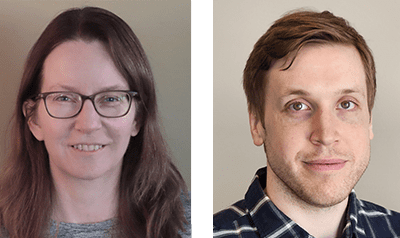Posted By: Kylee Spencer, PhD, Assistant Editor, AJHG
Each month, the editors of The American Journal of Human Genetics interview an author of a recently published paper. This month we check in with Karen and Nicholas to discuss their recent paper “Investigating the potential of single-cell DNA methylation data to detect allele-specific methylation and imprinting.”
KS: What motivated you to start working on this project?

KC: We were intrigued by the promise of single-cell DNA methylation data for a number of reasons, including the ability to more directly examine allele-specific methylation associated with germline or somatic variants. Single-cell approaches for DNA methylation data are still in their early days, with few labs generating this kind of data, so we were excited to come across a paper describing single-cell reduced-representation bisulfite sequencing of B-cell samples from healthy donors and individuals with chronic lymphocytic leukemia.
NJ: When we originally came across this dataset, we were interested in exploring further and considered possible secondary analyses of the data, including exploration of single-cell methylation patterns specific to cancer tissue. As we became more familiar with the data, particularly the strand- and allele-specific information, we realized the potential for characterizing methylation specific to each parental allele, and the opportunity for methodological improvement in this area, which could especially benefit researchers investigating imprinting.
KS: What about this paper/project most excites you?
NJ: We observed a strong enrichment of allele-specific methylation for imprinting-related features as well as a concordance of allele-specific methylation across individuals, which is to be expected under imprinting. What really excites me is that we were able to detect these strong signals in spite of the sparsity of single-cell methylation data. I think this bodes well for future single-cell methylation studies, particularly those that have greater coverage and therefore better detection potential.
KS: Thinking about the bigger picture, what implications do you see from this work for the larger human genetics community?
KC: This work illustrates one of the many ways the increased granularity afforded by single-cell sequencing gives us a more in-depth view of phenomena previously studied in bulk tissue. As a secondary analysis of previously-generated data, it also underscores that there is a wealth of phenomenal datasets that have been made publicly available and are great resources for methods development and many other off-label uses.
KS: What advice do you have for trainees/young scientists?
KC: I left another career to follow my passion for genetics and have never regretted this, so my advice would be to find a way to do the work that excites you even if it involves taking risks. This will often require some combination of figuring out how your particular skill set can be applied to ask the questions that interest you, identifying training opportunities to acquire additional skills you need, and seeking out collaborators with complementary expertise.
KS: And for fun, tell us something about your life outside of the lab.
NJ: I like to keep an active lifestyle and especially find solace in activities like hiking and indoor rock climbing. I’m also an avid reader of historical and political books, continually trying to expand my understanding of the world. Additionally, I enjoy browsing the internet for new, interesting recipes and then attempting to cook them with intermittent success!
KC: I also enjoy being active and my ideal trip involves traveling by bike or on foot with train travel as needed; this applies to vacations as well as to commuting and getting around town. A benefit is that you get to see more along the way, but I also like the physical and logistical challenges this brings. Finally, a perk of spring in Atlanta is that I’m answering these questions while sitting outside surrounded by 20 or so species of birds and some impressive butterflies as well.
